Originally Created on: January 21, 2024 @ 7:13 am
Are you tired of staring at a pile of fresh, juicy fruit, wondering if it’s truly safe to eat? We’ve all been there. The question on everyone’s mind: is it safe to wash fruit with dish soap? While some may argue that a quick rinse under running water is sufficient, others swear by the power of dish soap to remove harmful bacteria and pesticides. In this blog post, we’ll dive deep into the topic and explore the pros and cons of using dish soap on your favorite fruits.
When it comes to food safety, we can never be too cautious. With concerns about pesticide residues and foodborne illnesses constantly making headlines, many people are looking for ways to ensure their produce is clean and safe. But before you reach for that bottle of dish soap in your kitchen sink, let’s take a closer look at whether or not it’s the right solution for washing your fruit effectively without compromising its taste or nutritional value.
Table of Content
Highlights:
- Washing fruit with dish soap can leave harmful residues.
- Dish soaps contain chemicals not meant for consumption.
- Opt for washing fruits under running water to ensure safety and cleanliness.
Is it safe to wash fruit with dish soap?
Washing fruit with dish soap is not recommended as it can leave behind harmful residues. While dish soap may effectively remove dirt and bacteria from dishes, it is not designed for use on food items like fruits. Dish soaps often contain chemicals and fragrances that are not meant to be ingested, and these substances can linger on the surface of the fruit even after rinsing.
Instead, it is best to wash fruits under running water. This simple method helps remove dirt, pesticides, and any potential pathogens without leaving behind any unwanted residue. Gently rub the surface of the fruit with your hands or a soft brush to ensure thorough cleaning. By following this practice, you can enjoy clean and safe-to-eat fruits without exposing yourself to unnecessary risks.
In conclusion, while using dish soap may seem like an effective way to clean fruits, it is important to prioritize safety by opting for more suitable methods such as washing under running water. By doing so, you can ensure that your fruits are free from contaminants while avoiding potentially harmful residues left by dish soap.
You May Also Like: can dish soap cause chemical burns
What are the risks of washing fruit with dish soap?
Washing fruit with dish soap can pose several risks to your health. Firstly, dish soaps are designed for cleaning dishes and removing grease, not for consumption. They often contain harsh chemicals and fragrances that can leave residues on the fruit, which may be harmful if ingested. Secondly, some fruits have porous skins that can absorb the soap and its chemicals, leading to potential digestive issues or allergic reactions when consumed. Lastly, using dish soap on fruits may strip away the natural protective wax coating found on their skins, leaving them more susceptible to bacteria growth and spoilage.
In conclusion, it is best to avoid washing fruits with dish soap due to the potential risks it poses to your health. Instead, opt for rinsing them thoroughly under running water or using a produce wash specifically designed for cleaning fruits and vegetables. This will help remove any dirt or contaminants without introducing potentially harmful substances onto your fresh produce.
How to properly clean fruits before eating
When it comes to enjoying fresh fruits, proper cleaning is essential. Not only does it remove dirt and bacteria, but it also helps eliminate pesticides and other chemicals that may be present on the skin. To clean your fruits effectively, start by rinsing them under cool running water. Use a gentle scrub brush to remove any stubborn dirt or residue. For fruits with tougher skins like apples or oranges, you can also use a mild soap or produce wash. After washing, pat the fruits dry with a clean towel before consuming.
Taking the time to properly clean your fruits ensures that you’re not ingesting any harmful substances while enjoying their delicious flavors. By following these simple steps, you can have peace of mind knowing that your fruit is safe to eat and free from potential contaminants. So next time you reach for an apple or slice into a juicy watermelon, remember to give them a good rinse beforehand – your health will thank you!
Also Read: why does dish soap have a high viscosit
How do you remove pesticides from fruit naturally?
Are you concerned about the pesticides on your fruits? Luckily, there are natural methods to remove them. One effective way is by using a vinegar solution. Simply mix one part white vinegar with three parts water and soak your fruits in this solution for 15-20 minutes. Then, rinse them thoroughly under running water to get rid of any remaining residue.
Another natural method is to use baking soda. Create a mixture of one teaspoon of baking soda and two cups of water. Soak your fruits in this solution for 12-15 minutes before rinsing them well. Baking soda helps break down the pesticide residues, making it easier to wash them away.
By using these simple yet effective methods, you can reduce the presence of pesticides on your fruits naturally and enjoy healthier produce. Give it a try and savor the taste of worry-free fruits!
Also Read: can dish soap cause rash
Final Thoughts
In conclusion, washing fruits with dish soap is not recommended as it can leave behind harmful residues. It is best to wash fruits under running water to remove dirt, pesticides, and potential pathogens without compromising taste or nutritional value. Avoid using dish soap on fruits due to the risks it poses to health, such as ingesting chemicals and stripping away natural protective coatings. Instead, opt for rinsing with water or using natural methods like vinegar or baking soda solutions to remove pesticides effectively. Prioritize safety and enjoy worry-free, clean fruits.

